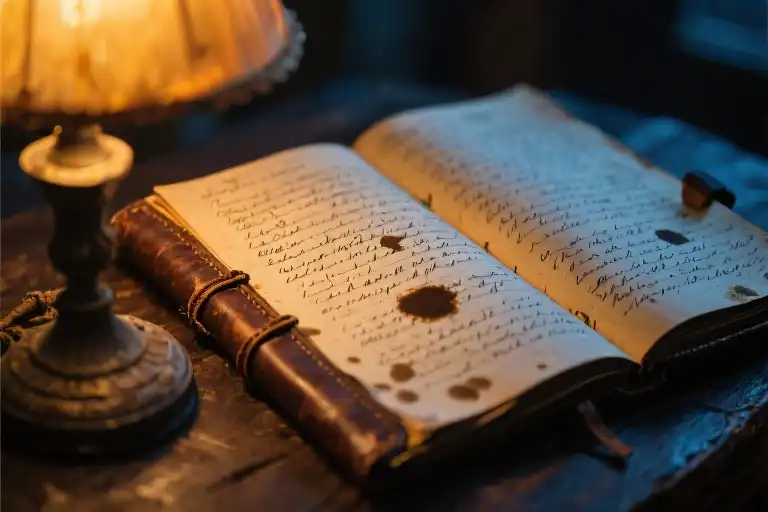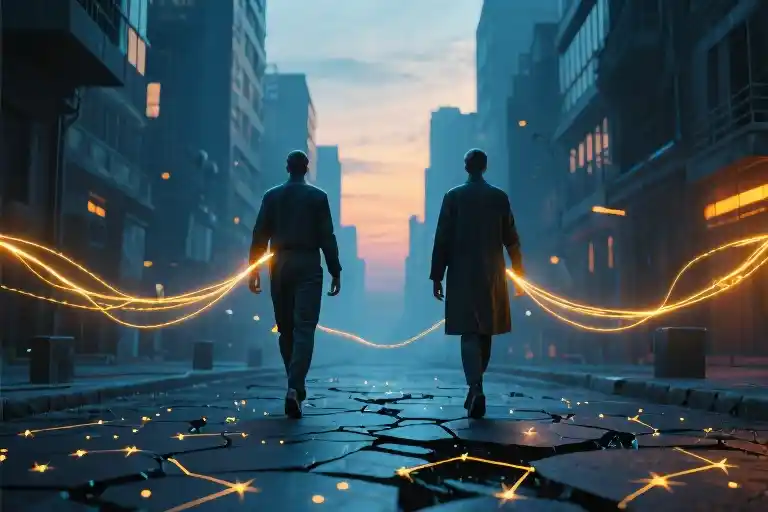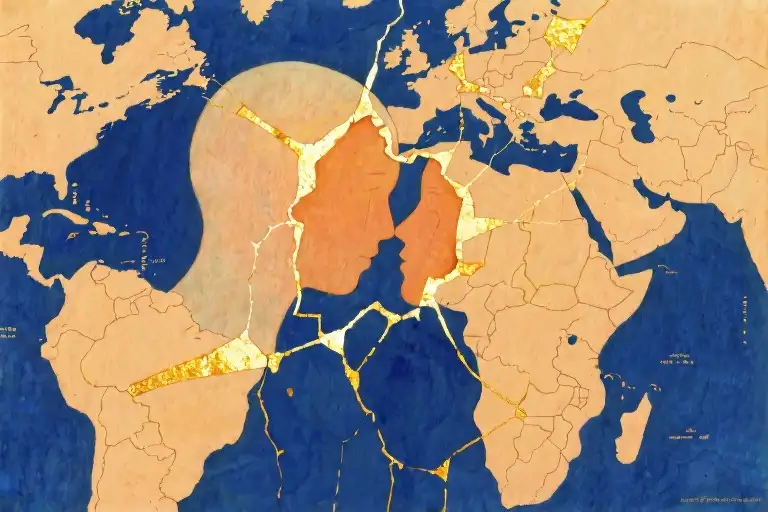I’ve been single for over seven years. Seven years of learning to enjoy my own company, seven years of building a life that felt complete without a partner. At some point, I stopped checking dating apps altogether. The idea of swiping through profiles felt exhausting – why disrupt the comfortable rhythm I’d created?
My apartment became my sanctuary, filled with books I wanted to read and art that spoke to me. Weekends meant spontaneous solo trips or lazy mornings with no obligations. I prided myself on being that “independent woman” everyone admires – self-sufficient, emotionally stable, happily single. Or so I told myself.
There were moments, of course. Nights when the silence felt heavier than usual. Times when I’d catch a couple laughing over shared jokes at a café and feel something twinge inside. But I’d quickly rationalize those feelings away. “You don’t need anyone,” I’d remind myself. “Relationships just complicate things.”
Then came the reunion that changed everything. Running into Sarah – my college roommate – at the farmers’ market last month. She looked radiant, not because she was with someone (she’s been divorced three years), but because she’d recently started dating again after her own long hiatus. “I forgot how fun it is to meet new people,” she confessed over coffee, her eyes sparkling in a way I hadn’t seen in years. “Not every date has to lead to marriage. Sometimes it’s just… human connection.”
That phrase stuck with me. Human connection. Not obligations, not compromises, just… connection. Maybe I’d been framing this all wrong. Maybe dating didn’t have to mean giving up my independence – maybe it could simply mean expanding my world.
That night, for the first time in years, I found myself staring at my phone’s app store, finger hovering over the download button of a dating app. The familiar fears surfaced immediately: The awkward small talk. The disappointing first meets. The potential heartbreak. But beneath them, something new – a quiet curiosity. What if?
I’ve been single for over seven years. Not the ‘casually dating here and there’ kind of single, but the ‘fully removed myself from the dating pool’ kind. My friends called it my romantic sabbatical. I preferred to think of it as strategic independence.
There’s an unexpected comfort in building a life that doesn’t accommodate romantic variables. Weekends became predictable in the best way – no awkward first dates analyzing someone’s table manners, no deciphering vague texts, no emotional energy spent on ‘where is this going?’ conversations. Just me, my golden retriever, and an ever-growing collection of unread books on my nightstand.
The Psychology of Self-Contained Happiness
What begins as temporary singleness gradually hardens into emotional infrastructure. You develop systems:
- Sunday meal prep for one
- Solo movie nights where no one judges your Nicolas Cage marathons
- An elaborate bedtime routine that would baffle any potential partner
After year three, I stopped noticing the absence. By year five, I’d created such efficient solitude that dating seemed like downgrading to dial-up internet in a fiber optic world. Why introduce unnecessary variables into an equation that already balanced perfectly?
The Turning Point
The shift happened unexpectedly during a college reunion. Watching my friend Sarah – who’d been divorced for a decade – glow while describing her new relationship with a philosophy professor. Not the giddy infatuation of our twenties, but something quieter and more substantial. ‘He’s 54,’ she mentioned casually, ‘which means we skip all the midlife crisis drama.’
That conversation planted a seed. Maybe my airtight single life wasn’t the fortress I’d imagined, but a carefully constructed escape room from vulnerability. The realization wasn’t dramatic – more like noticing you’ve been wearing one earring all day.
Re-Entry Protocols
Returning to dating after prolonged singleness requires psychological prep work:
- Accepting the rust: Dating skills atrophy like unused languages
- Calendar adjustments: Suddenly needing to allocate time for humans beyond dental appointments
- Vulnerability re-calibration: Remembering how to share personal data beyond your Starbucks order
What finally tipped the scales? The quiet understanding that independence and connection aren’t mutually exclusive. That perhaps true self-sufficiency means choosing companionship rather than needing to avoid it.
Why This Matters for Dating After 40
This mental shift is particularly crucial for women re-entering the dating scene in their fourth decade. We’re not the same people who last dated in our thirties. Our requirements have evolved from ‘chemistry’ checklists to something more nuanced:
- Emotional bandwidth over six-pack abs
- Shared values over shared music taste
- Life experience that’s weathered enough to be interesting but not cynical
Seven years of solitude taught me more about relationships than any dating history could. Now the challenge became applying that knowledge without letting it become another defensive wall. The first step? Admitting that my perfectly curated single life might have room for one more chair at the table.
The Case for Dating Men in Their 50s
After seven years of happily single life, I surprised myself by reactivating my dating apps last month. What surprised me more? My deliberate decision to exclusively date men in their 50s. This wasn’t some random preference – it came from careful consideration about what truly matters when dating after 40.
1. The Kid Factor (Or Lack Thereof)
Let’s start with the most practical reason: parenting timelines. By their 50s, men generally fall into two clear categories:
- Child-free by choice: If they haven’t had children by now, they’re statistically unlikely to change their minds. As someone who’s firmly in the ‘no kids’ camp myself, this eliminates a major compatibility issue upfront.
- Empty nesters: Those who did have children likely have older teens or adult children. No diaper changes, no custody schedules – just the occasional family dinner where we can enjoy their kids as actual human beings rather than parenting responsibilities.
A 2022 Pew Research study showed only 3% of men over 50 become first-time fathers. Those odds work perfectly for my lifestyle.
2. The Luxury of Time
Here’s something nobody tells you about dating in your 40s: everyone’s still too busy. Between careers, parenting, and personal commitments, most people our age are stretched thin. But men in their 50s? They’ve often reached that sweet spot:
- Established careers with more schedule control
- Financial stability that reduces work stress
- Life experience that helps prioritize relationships
My last date with a 52-year-old consultant? He actually blocked off entire weekends months in advance for getaways. Meanwhile, my 42-year-old matches were still canceling for ’emergency work calls’ at 8pm on Fridays.
3. Emotional Clarity
After decades of relationships (and likely a divorce or two), men in this demographic tend to have something younger guys often lack: self-awareness. Specifically:
- No games: They’re typically past the ‘playing hard to get’ phase
- Direct communication: Less guessing about intentions or expectations
- Conflict resolution skills: Those marital arguments had to teach them something, right?
Of course, this is all theoretical. As I quickly learned when my first ’50s only’ match turned out to be… 44. But we’ll get to that reality check later.
Pro tip for online dating after 40: Look for profiles mentioning ‘grown children’ or ‘no kids’ in the basics section. It’s one of the few filters that actually delivers what it promises.
Would you consider dating someone significantly older? What factors would matter most to you? Share your thoughts in the comments – I read every one.
When Reality Hits: The 44-Year-Old ‘Liar’
There’s a particular sound dating apps make when you get a new match – that little ding that’s supposed to signal possibility. After carefully setting my age filters to 50-60 and crafting what I thought was a foolproof strategy, that notification popped up on my screen. My first match in seven years.
44 years old.
I actually laughed out loud. Not a polite chuckle, but the kind of laughter that makes baristas turn their heads. The universe clearly had other plans for my carefully constructed dating experiment. The profile photo showed a perfectly nice-looking man hiking somewhere mountainous, wearing that standard-issue ‘outdoorsy but approachable’ expression every dating app male seems to master by age 40.
Our opening exchange went like this:
Him: Hey there! Saw we matched – what made you swipe right?
Me: Honestly? Your profile said you were 50. [insert crying-laughing emoji here]
Him: Wait really? I swear I set it to 44. Must be a glitch?
Now, I’m no tech novice. We all know there’s no ‘glitch’ that accidentally makes you six years younger on a dating platform. This was either a deliberate lie or the most convenient technical error since ‘the dog ate my homework.’ But instead of the frustration I expected to feel, something surprising happened – I found myself genuinely entertained.
The Unexpected Lessons From My First Mismatch
This 44-year-old ‘liar’ (as I affectionately dubbed him in my group chat) taught me three valuable things about online dating after 40:
- Filters aren’t forcefields – No matter how specific your criteria, life (and algorithms) will test your boundaries. That 50+ rule I’d considered non-negotiable? Suddenly negotiable when faced with an interesting human being.
- Age deception flows both ways – We always hear about men pretending to be younger, but my married friends confessed they’d often fudged numbers upward to avoid ‘immature’ matches. The entire system’s built on creative interpretation.
- Chemistry laughs at spreadsheets – All my logical reasons for choosing older men collided with the undeniable truth: connection either exists or it doesn’t, regardless of birth certificates.
What started as a humorous mismatch became a revelation about the fluidity of dating preferences. That 44-year-old and I ended up having two perfectly pleasant coffee dates before mutually agreeing there was no spark. But he did me an unexpected favor – he cracked open my rigid thinking about age requirements in dating.
As I left our second meeting, I caught myself wondering: Had I been using that ’50+ only’ rule as emotional armor? Was insisting on dating older men just another way to maintain control in the vulnerable world of relationships? The questions lingered longer than the match itself.
Perhaps the biggest takeaway wasn’t about his age, but about my own assumptions. Online dating tips for women often focus on setting firm boundaries – and rightly so – but rarely discuss when those boundaries might need re-evaluating. My ‘liar’ reminded me that meaningful connections rarely follow spreadsheets, no matter how logically we arrange the cells.
So here’s to the mismatches that make us think, the glitches that aren’t really glitches, and the 44-year-olds who accidentally teach us more about ourselves than any perfectly curated 50+ profile ever could.
Does Age Really Matter?
So here I was, staring at my phone screen showing a match with a 44-year-old. The irony wasn’t lost on me—my carefully crafted ’50+ only’ rule shattered by the first connection. That little blue notification icon seemed to wink at me, whispering: Rules are made to be broken, aren’t they?
This moment forced me to confront the bigger question we all dance around in online dating: Should age be a dealbreaker? The apps want us to treat it like one—those rigid age filters don’t allow for nuance. But human connection rarely fits neatly into dropdown menus.
The Numbers Game
Let’s be honest—we all have our checklist:
- ✅ Must love dogs
- ✅ Financially stable
- ✅ Good sense of humor
- ❌ No smokers
Age often gets lumped in with these tangible criteria. But unlike smoking or pet preferences, chronological age tells us shockingly little about:
- Emotional availability
- Lifestyle compatibility
- Relationship readiness
That 44-year-old match? His profile showed him hiking Machu Picchu last summer—meanwhile some 55-year-olds in my feed were posting blurry bar selfies. The numbers stopped meaning anything concrete.
What We Really Fear About Age Gaps
When we fixate on age requirements, we’re often masking deeper concerns:
For women dating older:
- ❗ “Will I become a nurse or a purse?” (The dreaded caregiver/money dynamic)
- ❗ “Do we share cultural references?” (TikTok vs. Seinfeld debates)
- ❗ “Is this about daddy issues?” (The therapy couch question)
For men dating younger:
- ❗ “Am I just a midlife crisis?”
- ❗ “Will we want the same things in 10 years?”
- ❗ “Can we bridge the maturity gap?”
These are valid questions—but notice none are actually about the number itself. They’re about values, energy, and life phases. A 50-year-old marathon runner might have more in common with a 40-year-old athlete than someone his age who’s planning retirement.
The Middle Ground
Maybe the solution isn’t abandoning age filters completely, but treating them like seasoning—a starting point, not the whole recipe. Here’s what worked for me:
- Flex the range – I kept my 50+ preference but allowed 5 years’ flexibility
- Screen for lifestyle – Asked “What does your typical weekend look like?” early in chats
- Watch for green flags – Did they mention:
- ✨ Ongoing self-improvement
- ✨ Curiosity about new experiences
- ✨ Friends of diverse ages
Your Turn
I’ll leave you with this: That 44-year-old match? We went on three dates before I realized our real incompatibility wasn’t his age—it was his obsession with yacht rock. Sometimes the universe has better filters than we do.
So tell me—what’s your take on age limits in dating? Have you ever made an exception that surprised you? Drop a comment below—I read every one.
Next time: How to spot those sneaky dating profile lies (because apparently, some people think 44 is ‘basically 50’)…





